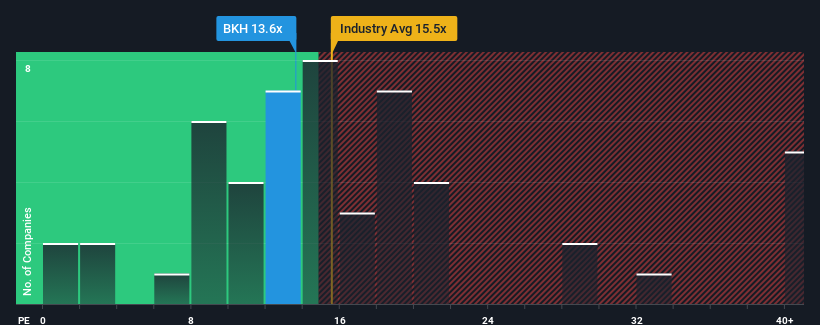- United States
- /
- Other Utilities
- /
- NYSE:BKH
Investors Aren't Buying Black Hills Corporation's (NYSE:BKH) Earnings

When close to half the companies in the United States have price-to-earnings ratios (or "P/E's") above 17x, you may consider Black Hills Corporation (NYSE:BKH) as an attractive investment with its 13.6x P/E ratio. However, the P/E might be low for a reason and it requires further investigation to determine if it's justified.
Black Hills' negative earnings growth of late has neither been better nor worse than most other companies. It might be that many expect the company's earnings performance to degrade further, which has repressed the P/E. If you still like the company, you'd want its earnings trajectory to turn around before making any decisions. At the very least, you'd be hoping that earnings don't fall off a cliff if your plan is to pick up some stock while it's out of favour.
View our latest analysis for Black Hills

How Is Black Hills' Growth Trending?
Black Hills' P/E ratio would be typical for a company that's only expected to deliver limited growth, and importantly, perform worse than the market.
Retrospectively, the last year delivered a frustrating 1.7% decrease to the company's bottom line. This has soured the latest three-year period, which nevertheless managed to deliver a decent 5.2% overall rise in EPS. Accordingly, while they would have preferred to keep the run going, shareholders would be roughly satisfied with the medium-term rates of earnings growth.
Turning to the outlook, the next three years should generate growth of 4.0% each year as estimated by the dual analysts watching the company. With the market predicted to deliver 10% growth per year, the company is positioned for a weaker earnings result.
With this information, we can see why Black Hills is trading at a P/E lower than the market. It seems most investors are expecting to see limited future growth and are only willing to pay a reduced amount for the stock.
The Key Takeaway
It's argued the price-to-earnings ratio is an inferior measure of value within certain industries, but it can be a powerful business sentiment indicator.
We've established that Black Hills maintains its low P/E on the weakness of its forecast growth being lower than the wider market, as expected. Right now shareholders are accepting the low P/E as they concede future earnings probably won't provide any pleasant surprises. Unless these conditions improve, they will continue to form a barrier for the share price around these levels.
There are also other vital risk factors to consider and we've discovered 2 warning signs for Black Hills (1 can't be ignored!) that you should be aware of before investing here.
You might be able to find a better investment than Black Hills. If you want a selection of possible candidates, check out this free list of interesting companies that trade on a low P/E (but have proven they can grow earnings).
Valuation is complex, but we're here to simplify it.
Discover if Black Hills might be undervalued or overvalued with our detailed analysis, featuring fair value estimates, potential risks, dividends, insider trades, and its financial condition.
Access Free AnalysisHave feedback on this article? Concerned about the content? Get in touch with us directly. Alternatively, email editorial-team (at) simplywallst.com.
This article by Simply Wall St is general in nature. We provide commentary based on historical data and analyst forecasts only using an unbiased methodology and our articles are not intended to be financial advice. It does not constitute a recommendation to buy or sell any stock, and does not take account of your objectives, or your financial situation. We aim to bring you long-term focused analysis driven by fundamental data. Note that our analysis may not factor in the latest price-sensitive company announcements or qualitative material. Simply Wall St has no position in any stocks mentioned.
About NYSE:BKH
Black Hills
Through its subsidiaries, operates as an electric and natural gas utility company in the United States.
Average dividend payer and fair value.


